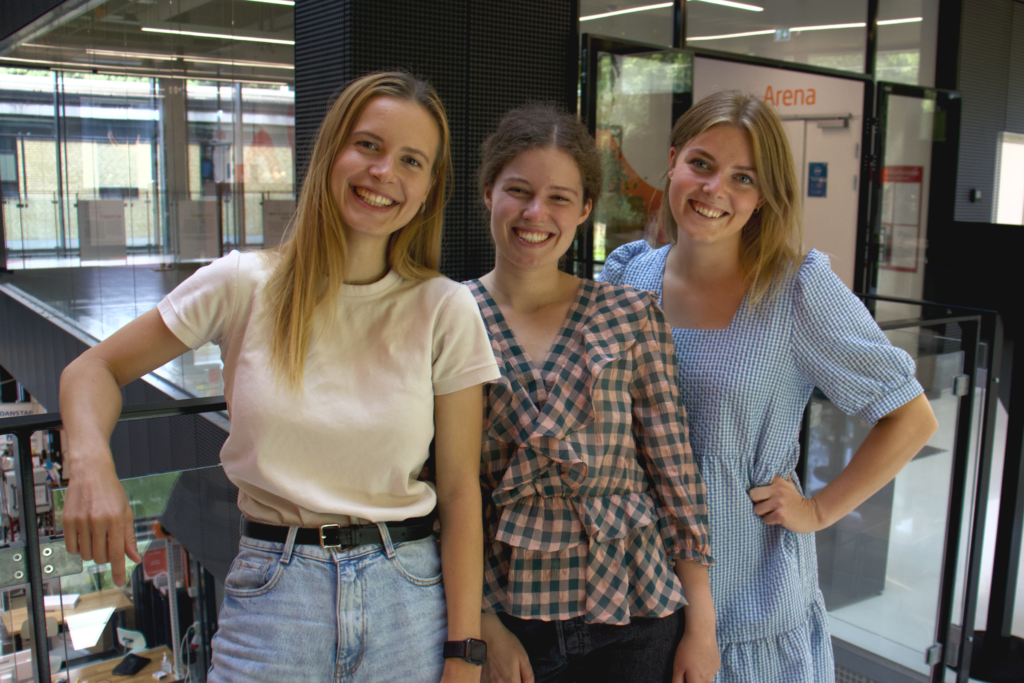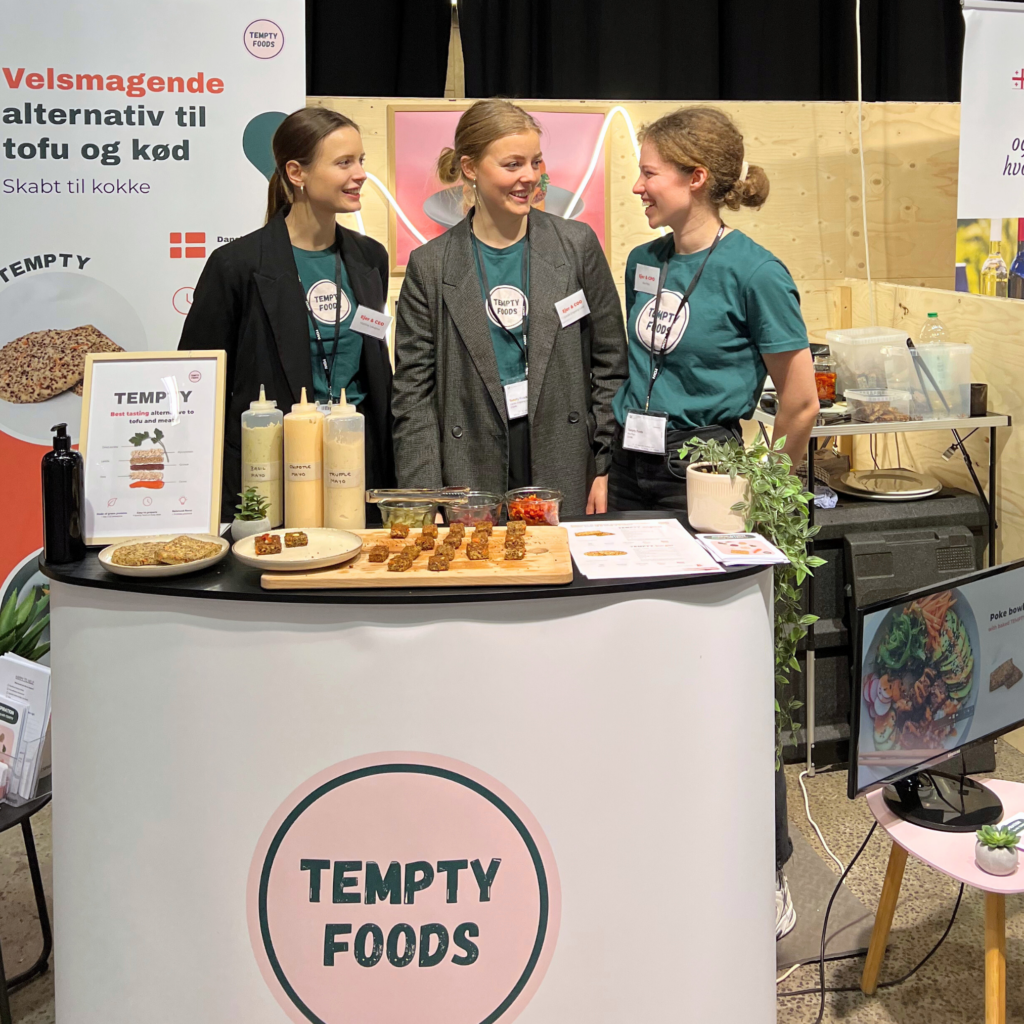Who is Martina Lokajova?
Martina Lokajova is a 28-year-old entrepreneur from the Czech Republic. She is the co-founder & CEO of Tempty Foods—a Danish food innovation company that creates food ingredients using fungi. In 2023, Tempty Foods became the first Danish company to launch mycoprotein-based products after entering a partnership with UK-based Marlow Ingredients. They were also awarded Startup of the Year at Danmarks Tekniske Universitet (DTU) in 2022.
Martina moved to Denmark from the Czech Republic in 2015 to pursue a bachelor’s degree at UCN in Aalborg, and later CPHbusiness in Copenhagen.. She later earned a master’s degree in Technology Entrepreneurship from DTU in 2022.
“I’m a person who is very passionate about making a difference. I found a soul focusing on making a change in the food industry,” said the second-time entrepreneur.
Narcis, founder and editor of the Last Week in Denmark Newsletter, interviewed Martina, who shared her experiences and insights from running a startup in Denmark. We explored her background, challenges, and key learnings that shaped her entrepreneurial journey in Denmark.

Early Entrepreneurial Attempts
During her studies in entrepreneurship and innovation at the Copenhagen Business Academy, Martina Lokajova set out on her first business venture, aiming to create a solution for staying in shape while injured. “I tend to start finding solutions to the problems I am facing. I was often injured and had no luck finding help to stay in shape while being injured,” she explained.
Despite initial excitement and securing partnerships, the venture struggled due to a lack of a technical team. Martina and her co-founder faced significant challenges developing an app without sufficient technical knowledge, which limited their ability to guide developers effectively. “The venture failed before it started. I think we could have taken it further if we had managed to find the right people. My gut feeling, however, is that it wouldn’t have been a huge success based on the market today,” Martina reflects.
Founding Tempty Foods
Forming the Team

Martina implemented the lessons she learned from the first venture. She co-founded Tempty Foods along with Ana Pejic and Cecilie Engvang Lund.
Just like in her first venture, the origins of Tempty lie in Martina’s pursuit to find solutions to the problems she is currently facing. The journey with Tempty Foods began during the technology entrepreneurship course at DTU, where she discovered the potential of mycelium-based products due to her dietary challenges with legumes.
Recognising the need for a competent team, she joined the Development of Future Food course, where she met Cecilie and Ana. Their complementary backgrounds—Cecilie in fermentation and food technology, Ana in food development and nutrition, and Martina in business—created a perfect synergy. Despite initial networking challenges, they actively participated in industry events and secured experienced advisors who became investors and partners. This strategic combination of skills and connections was crucial in establishing Tempty Foods’ presence and success in the food industry.
Contrary to the popular opinion that multiple co-founders can complicate decision-making, Martina believes it provides a unique advantage. Having three people ensures that there are always diverse perspectives, making it easier to reach well-rounded decisions. The varied backgrounds and personalities of the co-founders contribute significantly to the company’s success, allowing them to tackle problems from different angles. Martina believes this collaborative approach has been a key factor in their achievements over the past three years, demonstrating that a team of three can be highly effective and beneficial for the business.
Since kicking off operations in 2021, Tempty Foods has:
- launched two products in the Danish market in partnership with 5 major wholesalers, like Dagrofa, Dansk Cater and Hørkram.
- They became the first Danish company to partner with UK-based Marlow Ingredients, the sister company of Quorn, to launch mycoprotein-based products.
- Raised a pre-seed investment round through 7 investors.
- It has been rated among the top 5 food startups in Denmark by the Danish Startup Group and among the top 3 green startups in Denmark by Dansk Vegetarisk Forening (DVF).
Strategic Steps to Success
Martina Lokajova discusses how Tempty Foods differentiates itself in the competitive market of meat alternatives. Unlike companies that focus on direct meat replacements, Tempty Foods offers products that do not imitate meat, providing unique textures and taste profiles.
Addressing concerns about competition and intellectual property, Martina highlights the importance of strategic positioning and partnerships. Tempty Foods has a pending patent and trademarks, but Martina believes that collaboration and relationship-building are more critical for long-term success.
“We are happy to have more mycoprotein-based companies coming in and developing products that consumers can adopt and help reduce meat consumption.”
Journey to Profitability
Martina jogs back her memory to when the company began at DTU in 2021, quickly gaining momentum through accelerator programmes and grants. Within six months, they established Tempty Foods as an ‘Anpartsselskab’ (ApS) to meet crowdfunding prerequisites. An “ApS” is a Danish limited liability company structure.
Throughout 2022, they focused on product development, testing their first product with over 10,000 people. Recognising limited retail demand for plant-based foods, they pivoted to the B2B segment, targeting chefs through wholesalers. This strategic shift allowed them to start generating revenue early.
Programmes like InnoFounder and GreenUp Accelerator, along with a convertible loan and angel investments, have helped sustain operations and move towards profitability. Although not yet fully self-sustaining, Martina is optimistic about the future of the company.
Key Lessons for Aspiring Entrepreneurs
Future entrepreneurs from international backgrounds in Denmark can learn invaluable lessons from Martina Lokajova’s journey with Tempty Foods.
“It’s all about the team,” she says, and here is why.
Firstly, the importance of assembling the right team cannot be overstated. A team with complementary skills and the ability to work well together is crucial. Without the necessary competencies to develop a minimum viable product (MVP) or a harmonious co-founder relationship, any startup will struggle.
The second lesson is the significance of surrounding oneself with advisors and mentors early on. Martina confesses that the experience in the Skylab accelerator programme highlighted how vital it is to understand team dynamics and communication styles. Additionally, leveraging resources and support from institutions, such as universities, can provide crucial infrastructure and financial stability during the early stages.
These elements—team cohesion, advisory support, and institutional resources—Martina points out were pivotal to Tempty Foods’ success and are essential considerations for any aspiring entrepreneur. “Ask yourself frequently, how much do you want it?”
Key Trends in the Danish Food Industry
For those international entrepreneurs in Denmark who are looking to start in the food industry, here are some insights from Martina on what is creating a buzz in the industry at the moment.
Martina warns that starting a food company, especially one connected to street food or restaurants, is challenging due to tight margins. Emerging trends, however, can provide new opportunities. One notable trend is the rise of ghost/cloud kitchens, where multiple food brands operate from a shared kitchen space, offering takeaway services without the need for a dine-in area, thus reducing costs. In Copenhagen, this model seems to be gaining traction lately.
Additionally, fermentation and upcycling ingredients are gaining popularity. Upcycling involves repurposing food waste into valuable ingredients, enhancing sustainability, and creating innovative flavour profiles. These trends reflect a shift towards more sustainable and health-conscious food practices in Denmark.
On collaborating with Tempty
Martina encourages entrepreneurs to build an environment of collaboration and partnerships.
“At Tempty, we are committed to supporting our customers and partners in various ways. Our products, such as TEMPTY burger and TEMPTY Original, are available through all major wholesalers, allowing easy access for companies.
We actively assist entrepreneurs and chefs by providing recipe inspiration, conducting tasting meetings, and offering tailored advice to ensure their success in promoting and serving TEMPTY products. Our goal is to foster long-term partnerships and help our customers thrive in their culinary endeavours.
You can contact the team at Tempty and even order samples of their products using this link.

Personal and Professional Growth
Adapting to Denmark
Martina is no stranger to travelling and living abroad. Through volunteering and internship programmes, she has lived in Malaysia and Kenya in the past. When asked about her experience adapting to Denmark as an aspiring entrepreneur, she said, “Ethnic background and language did present some challenges, particularly in sales. Despite my experience in partnerships and sales, connecting with the Danish food industry was difficult due to the language barrier.”
This led to fellow co-founder, Cecilie, taking on the sales role, leveraging her Danish language skills and natural social connection abilities. However, Martina stresses that within their team and in networking at events—many of which are conducted in English—being from the Czech Republic was not a significant hurdle. While certain Danish-language events and opportunities would have been beneficial, they were not critical to our success.
“Overall, we navigated these challenges by leveraging our strengths and adapting to the local business environment.”
Do entrepreneurs need to work 12 hours a day?
Martina admits that early on, while balancing between studies and the startup, they often worked 12-14 hour days. However, transitioning to full-time roles, they quickly realised this wasn’t sustainable.
“Maintaining a healthy work-life balance is crucial for long-term success and well-being. Our company culture supports this by ensuring no one is forced to work weekends or long hours.”
While passion for our work keeps them motivated, Martina believes it’s essential to enjoy life outside of work too, including exercise, healthy eating, and relationships. This holistic approach helps her stay positive and make better business decisions without constant stress.
State of female entrepreneurs in Denmark
According to a report published by Statistica in 2023, Poland was the only OECD member that had a female-to-male entrepreneurship ratio of more than one in 2022-23. For every male founder, there were 1.07 female founders. Denmark had a ratio of 0.68.
The Danish Startup Bible is a yearly magazine produced by TechSavvy Media in collaboration with TechBBQ and published by TechSavvy Media. Jeanette Carlsson, Founder & CEO of Tech Nordic Advocates, wrote in her column for the 2023 edition of the magazine that “far too few female-led startups from Denmark manage to grow and create exports. This is partly due to limited access to capital and investment in startups founded or led by women. This needs to change because we’re missing out on huge growth potential when capital bypasses female entrepreneurs.”
Cecilie Brøkner, Director of the Danish Innovation Fund, mentions that “Denmark has a low number of spinouts from universities compared to the countries we compare ourselves to. On average, university-based companies grow faster and create more jobs than other companies once the startup period is over. This is a significant innovation potential that we need to be better at realising.”
Tempty Foods is among a small group of startups founded by women. In this case, two out of the three co-founders are internationals in Denmark. Plus, they can be considered a spinout from DTU. The change internationals have awaited in Denmark might just be on the horizon.
Martina ends with a message to the public, “ We are on a mission to bring innovation to consumers’ plates and we want to do it with others alongside. It’s not just about us.”






